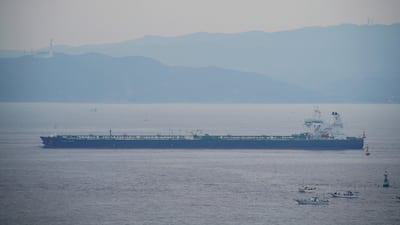Iran’s aggressive tactics in international waters in recent years, including increased acts of hijacking and attacking vessels carrying oil and other vital commodities, have escalated tension in the already volatile Middle East.
These acts are seen by Tehran as strategic moves in its long-running struggle with the West, mainly the US, over its nuclear programme. Iran is also seeking to assert its influence on key maritime checkpoints such as the Strait of Hormuz.
“It is part of Iran's tit-for-tat strategy to create chips they can use in their negotiations with the US and the West,” Randa Slim, senior fellow and director of the Conflict Resolution and Track II Dialogue Programme at the Washington-based Middle East Institute, told The National.
There has been an increase in these attacks since 2019, a year after the collapse of the Iran nuclear deal when then-US president Donald Trump ditched the agreement and reimposed sanctions that have crippled Iran's economy. Efforts to revive the pact have failed.
“The higher costs Tehran can impose on the West through disruptions to international commerce, the better they believe their chances are to force the US and allies to sit at the negotiation table with them,” Ms Slim said.
In July 2023, the US said Iran had “attacked or seized” nearly 20 internationally flagged merchant vessels since 2021. Since May last year, the US Navy has increased its presence in the Strait of Hormuz, a crucial transit route for a fifth of the world's crude oil and oil products.
Iran has seized two oil tankers in January as tension continues to simmer in the region with the Israel-Gaza war now nearing its fourth month.
Tehran's proxies have also escalated their attacks on US forces in Iraq and Syria as well as on vessels crossing the Red Sea, in what they say is a response to Washington's support of Israel in the conflict.
On Sunday, Iran's Islamic Revolutionary Guard Corps seized a foreign oil tanker and detained its 14-member Asian crew, the state-run Islamic Republic News Agency reported.
Iran has accused the unidentified vessel of transporting two million litres of “smuggled fuel”, and it was seized by court order 96km off the coast of Bandar-e-Bushehr. No more details have emerged since then.
Earlier this month, the Iranian navy boarded a Marshall Islands-flagged oil tanker once at the centre of a dispute between Washington and Tehran.
The seizure was in retaliation for a “violation committed by the Suez Rajan ship … and the theft of Iranian oil by the United States”, Iranian news agency Irna reported.

Although, these Iranian operations are “part of the shadow war” between Washington and Tehran that has carried on for years, they add “other potential flashpoints to an already volatile situation” in the region, Ms Slim added.
The latest Iranian moves coincide with a series of Red Sea attacks by Yemen’s Iran-backed Houthi rebels, compounding the risk to a high-traffic maritime trade route. The Houthis say they are acting in retaliation for Israel’s war in the Gaza Strip.
The latest turmoil in the Middle East has increased fears of supply bottlenecks as well as skyrocketing oil, good and shipping prices.
Although, crude oil fell below $77 a barrel on Tuesday, the market will monitor with caution any strong US response to conflict in the Middle East that could take prices higher.
The White House is weighing potential action after Iranian-backed militants killed three soldiers in a drone assault, while Tehran has sought to distance itself from the attack.
That incident followed a Houthi missile strike Friday on a vessel carrying Russian fuel for Trafigura Group, the most significant attack yet on a ship carrying energy products.


